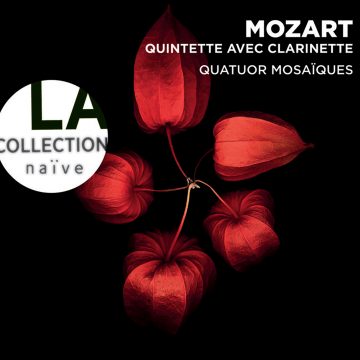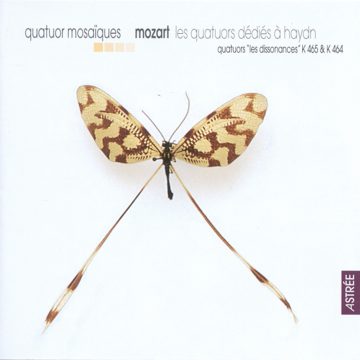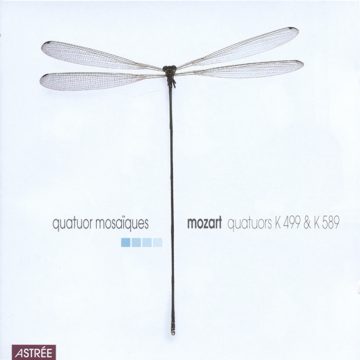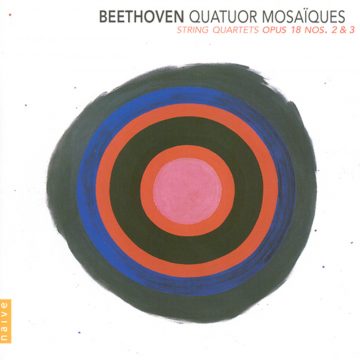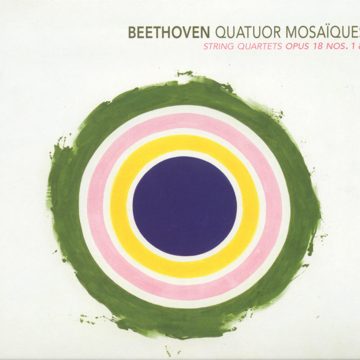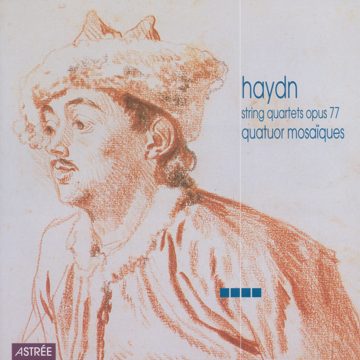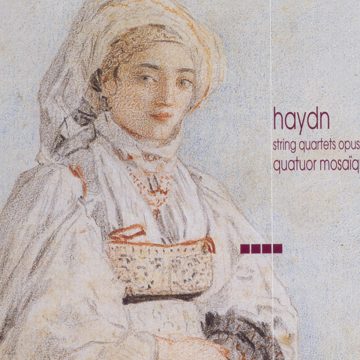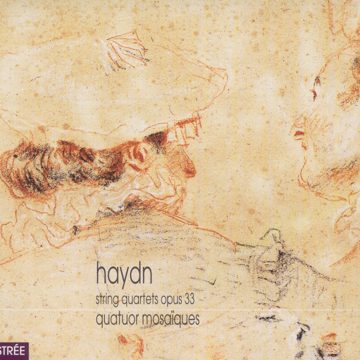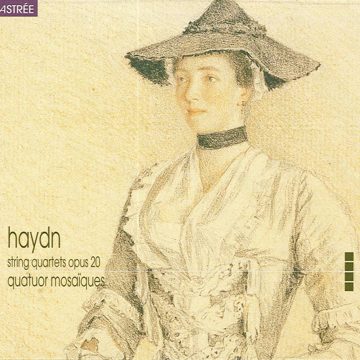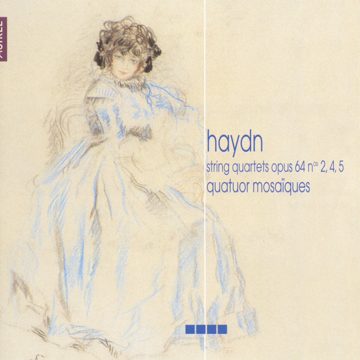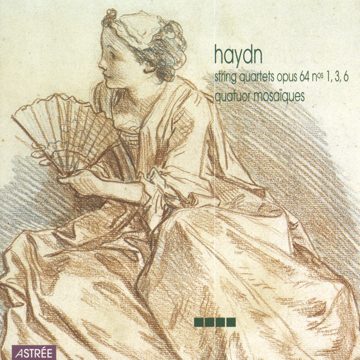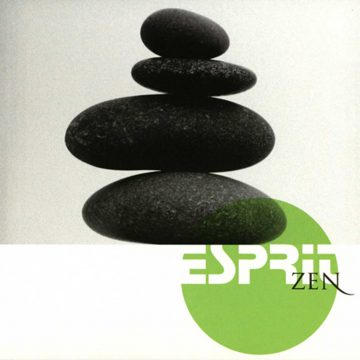Quatuor Mosaïques is the most prominent period-instrument quartet performing today, celebrating their 40th anniversary in the 2024-25 season. The ensemble has garnered praise for its atypical decision to use gut-stringed instruments which, in combination with its celebrated musicianship, has cultivated the group’s unique sound. The Quartet has toured extensively, won numerous prizes and established a substantial discography. Formed in 1985, the group is comprised of Austrians Erich Höbarth (violin), Andrea Bischof, (violin), Anita Mitterer (viola), and the French cellist Christophe Coin. The Quartet has appeared in Europe, the United States, Australia and Japan and regularly performs in Vienna, London’s Wigmore Hall, Amsterdam’s Concertgebouw and Berlin’s Philharmonic Hall. Quatuor Mosaïques often appears at prestigious European festivals such as Edinburgh, Salzburg, Luzern, Bremen, Bath, Styriarte Graz, Schubertiade Schwarzenberg and Oslo, among others, and has collaborated with many international artists including pianists András Schiff and Patrick Cohen, clarinetists Wolfgang Meyer and Sabine Meyer and cellists Miklós Perényi and Raphael Pidoux.
Quatuor Mosaïques has an extraordinarily extensive discography which includes works of Haydn, Mozart, Arriaga, Boccherini, Jadin, Beethoven, Schubert and Mendelssohn as well as modern composers. Of the group’s latest release, Schubert’s Der Tod und das Mädchen, The London Times writes, “their performance of Death and the Maiden is music-making of a high order, felt and carried out by players animated as though by a single mind and impulse, yet each of them seeming to respond afresh at every moment.” Recordings of the Wiener Klassik repertoire (Haydn string quartets: Op.20, 33, 77 and the quartets of Mozart dedicated to Haydn) have been awarded numerous prizes such as the Diapason d’or, the Choc du Monde de la Musique, and a Gramophone Award. To coincide with their 30th anniversary, Quatuor Mosaïques released a disc of the complete Beethoven’s Late Quartets for Naïve Records. This will be followed by a disc of Beethoven’s Middle Quartets for the same label.
These four musicians met while performing with Nikolaus Harnoncourt’s Concentus Musicus in the 1980’s, and decided to perform on original instruments as a classical “caper quartet.” Although the Quartet performs on period instruments it embraces the European quartet tradition, constantly allowing for the evolution of its repertoire as it strives to reveal the music’s psychological underpinnings.
This biography is for information only and should not be reproduced.
Haydn Series at Wigmore Hall
Wigmore Hall, 30 & 31 May 2018
The integrated sound of the Quatuor Mosaïques represented an ideal basis for the opening of Haydn’s rather serious C-minor String Quartet. The Moderato moved forward, regular in rhythm yet always expressive… Erich Höbarth’s violin stood clear when required, not because of forcefulness, but rather through his bright elegant tone… A delightfully bucolic element was evident in the Allegro Minuet – Quatuor Mosaïques always convince in dance movements. The dashing final Presto was swept excitingly forward….As an encore we were charmed by the Adagio cantabile from Haydn’s Opus 64/4: a perfect vehicle to demonstrate the unified beauty of tone and sensitivity displayed by this ensemble.
Antony Hodgson, Classical Source
Beethoven: The Late String Quartets CD
Naïve Records, October 2017
The Mosaïques inflect the music with myriad deft touches that reveal this miraculous score as a new way forward ... one of the most revelatory and thought-provoking sets of these timeless classics in decades.
Julian Haylock, The Strad February 2018 - 'The Strad Recommends'
Quatuor Mosaïques bring warmth and subtlety to these fascinating works.
Andrew Clements, The Guardian ****
Their playing is so natural and communicative that fans will find gold in every measure [...] Quatuor Mosaïques’ Beethoven is different from performances on modern instruments in its ease. The sound comes so responsively off their gut strings that they can spin the composer’s long lyric lines effortlessly as if singing to silent words (such as in the Heiliger Dankgesang movement of Op. 132), be assertive and gruff when required without making noise (the sul ponticello stretch in the Presto of Op. 131), and handle tricky technical stuff with graceful fantasy (the Presto of Op. 130) [...] this is a treasure. Do not let it go.
Laurence Vittes, Early Music America
As far as I'm aware this is the first and only recording of these works on 'period' instruments - using gut strings and early nineteenth-century bows, whilst employing a more limited use of vibrato than one generally hears. But there is no lack of warmth to the sound, and the transparent textures reveal plenty of details - both melodic and harmonic - which provide a freshness which is at times quite revelatory.
Chris O'Reilly, Presto Classical
Celebrity Series of Boston
NEC's Jordan Hall; 14 October 2017
After the intermission, we were treated to Haydn’s Quartet in C Major, Opus 20, No. 2, one of the “Sun” Quartets. Musical commentary often presents Haydn as an appetizer or a warm-up for the main piece of the performance. This was not the case in Quatuor Mosaïques’ performance. It was the Haydn [...] that had the audience voicing their adulation. We got what we expected from the Mozart quartets — graceful melody, refinement, clean execution. [...] it was as if I were hearing Haydn for the first time. They played his “Sun” Quartets with such playful articulation and tasteful rubato. [...] The Quartet performed the suspensions and sweet harmonies of the sunny first movement as naturally as the intense unison recitative of the more brooding second movement. The four-voice fugue finale spotlighted the musicians’ technical virtuosity. [...] After the ovation the quartet received, Quatuor Mosaïques could not have left the stage without giving the audience another taste of their talent and rounded off the evening with an exquisite rendition of the Andante of Haydn’s Op. 33, No. 6 Quartet. [...] I am grateful that Quatuor Mosaïques superb performance allowed me to see some of the finer details.
Alexandra Sourakov, The Tech
Haydn, Mozart and Beethoven at Wiener Konzerthaus
December 2016
The Quatuor Mosaïques made a chamber music evening in the concert hall into a breathtaking experience: art became emotion, emotion became art. Storytellers like the Quatuor Mosaïques were listened to with dedication.
Wilhelm Sinkovicz, Die Presse
Residency at Perth Concert Hall with pianist Susan Tomes
February 2016
What an extraordinary weekend’s music-making in Perth Concert Hall. “I have never heard string quartet-playing of that quality,” said an elderly gentleman whom I do not know. “And nor have I, sir”, was the only response I could come up with. The group was Eric Hobarth’s Quatuor Mosaiques, which is the finest period-instrument string quartet in the world. [...] their timing, co-ordination, scrupulous balance, incredible texturing that lets the light stream through, and seamless integration are beyond scientific explanation. They are magicians of unquantifiable skill and experience, and what they do beguiles the eye, the ear and the mind. What they did at the weekend was spell-binding.
Michael Tumelty, The Herald *****
These were beguiling concerts [...] It all looked so easy, the quartet's seemingly casual demeanor exuding a comforting warmth, within which the tonal balance tilted and swayed to reveal the naturally-flowing complexity of Mozart's genius.
Kenneth Walton, The Scotsman *****
From the first notes the joy in communication of this quartet came over. [...] And rightly appreciated as such, recalling the artists to the platform even once the house lights were on.
Iain Stuart-Hunter, Perthshire Advertiser
Haydn String Quartet in Bflat, Op.76 No.4, Mozart in D K575, Beethoven in F Op.18 No.1
Wigmore Hall April 2011
a wonderfully uplifting chamber concert
Seen and Heard International
what distinguishes their performance is the combination of warm and sonorous tone of gut strings and elegantly shaped and articulated phrasing
BachTrack.com
Aldeburgh Music Festival
September 2011
the world’s premier period-instrument quartet
The Independent
Bath Mozartfest
November 2008
I can think of few more enjoyable experiences than listening to the Quatuor Mosaïques plying Haydn, Mozart and Beethoven string Quartets.
Hugh Canning, The Independent
Mozart’s Quartet No. 3
Frick's music room New York
Mozart's melodic lines were delivered with rich sound and spacious lyricism
The New York Times
These photos are available to be downloaded.
Right click on a desired image and select the "Save Link As" option.

